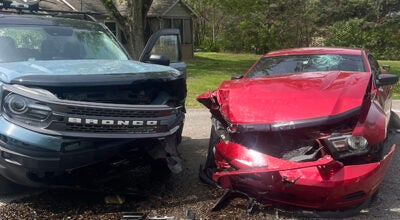Ask Trooper Rob: Be prepared for deer, slippery roads
Published 11:03 pm Wednesday, November 16, 2011
As temperatures get colder and hunting season has arrived, the Michigan State Police reminds motorists to be alert for deer. While car-deer crashes are a year-round problem, deer are most active in fall and spring. When a deer appears on a roadway, drivers only have a brief moment to react. The most serious crashes occur when motorists swerve to avoid a deer and hit another vehicle or a fixed object, or when their vehicle rolls over.
Avoid a car-deer crash
Stay aware, awake and sober. Heed deer crossings and speed-limit signs. Signs are placed in known deer crossing areas to alert you of the likely presence of deer. Deer are herd animals and frequently travel in a single file line. If you see one deer cross the road, chances are more are waiting.
Be alert for deer, especially at dawn and dusk. Almost 80 percent of all car-deer crashes occur on two-lane roads between dawn and dusk. Do not rely on gimmicks such as flashing your high-beam headlights or honking your horn to deter deer.
If a crash is unavoidable: Do not swerve. Brake firmly, hold onto the steering wheel and bring your vehicle to a controlled stop.
Pull off the road, turn on your emergency flashers and be cautious of other traffic if you leave your vehicle.
Do not attempt to remove a deer from the roadway unless you are certain it is dead. An injured deer’s hooves can easily hurt you. Report the crash to the nearest police agency and your insurance company.
The MSP Precision Driving Unit and the Lansing Area Safety Council are providing safety tips for safe winter driving.
Winter driving tips
• Keep your car’s windshield solvent at full strength and reservoir full, and keep new wiper blades on front and rear wipers, if so equipped.
• Keep your car washed for better visibility to other drivers, and remove ice and snow from all lights, windows, and license plate before driving.
• Periodically check all lights and replace when necessary.
• If you are stranded in a winter storm, do not leave your vehicle. Stay with the vehicle and wait for help. If you have a cell phone, keep it charged for emergency calls and keep your vehicle fueled.
“Michigan weather is unpredictable anytime of the year, but especially during the winter months,” said Sgt. James Fliegel, MSP Precision Driving Unit. “The most important fact to remember is the handling capability of your car is drastically reduced in winter weather, so it’s best to use slower speed to compensate for poor handling.”
Additionally, troopers remind motorists to be aware of several factors when stopping and turning in winter weather.
Do all of your braking before the turn is made and take proper line of travel through the turn to reduce the potential for a skid.
If your car begins to skid, correct the skid by getting off the throttle, staying off the brakes and use quick hand- over-hand steering technique to turn the front tires in the direction of the skid.
Be cautious and remember vehicles can’t perform at higher speeds on the winter roads like it can throughout the rest of the year and braking distance is severely reduced on the icy and snowy roads.






